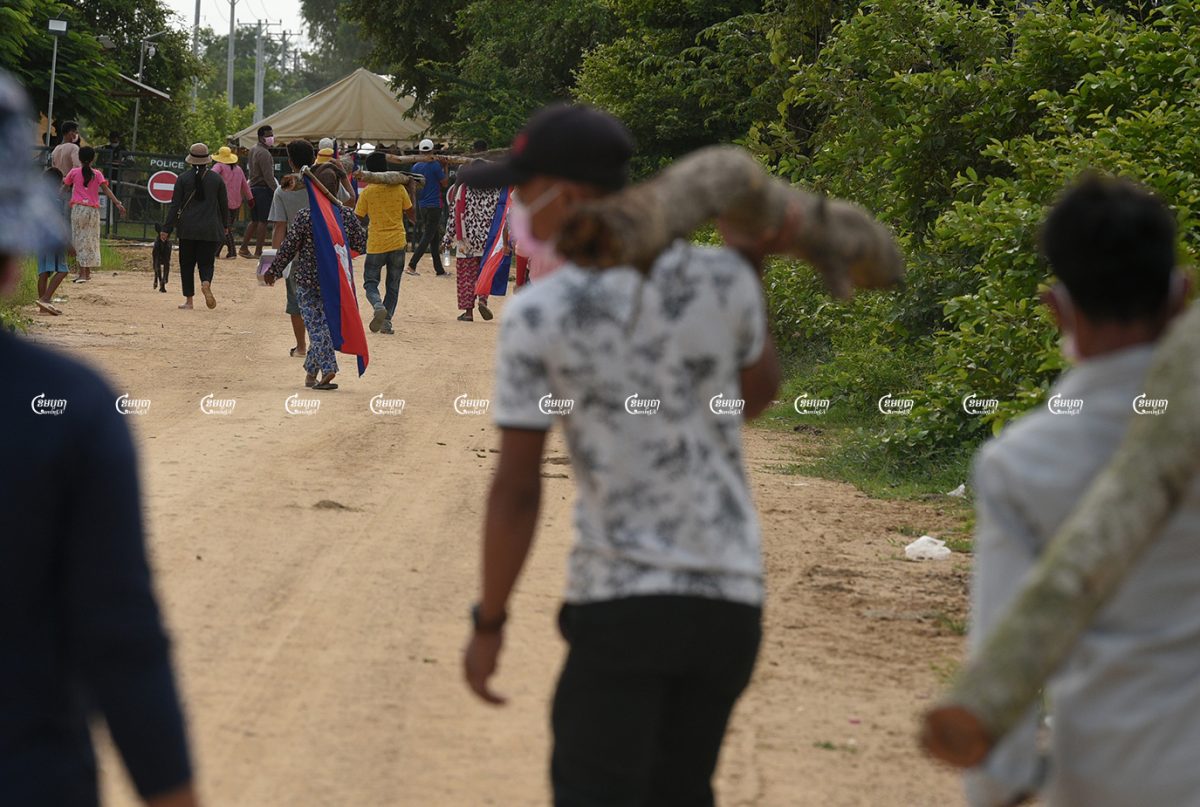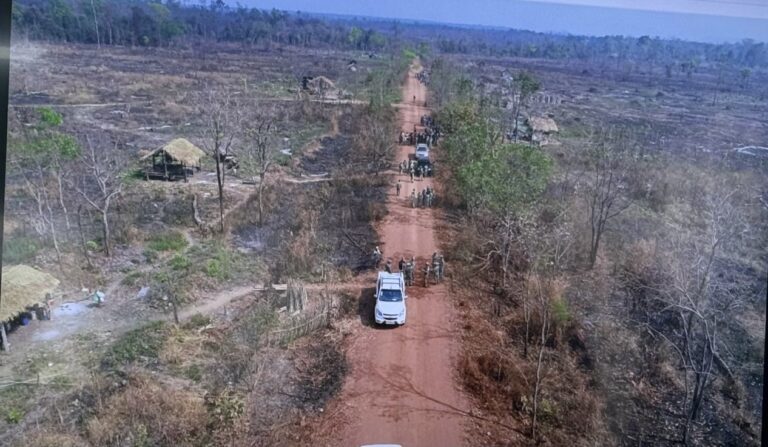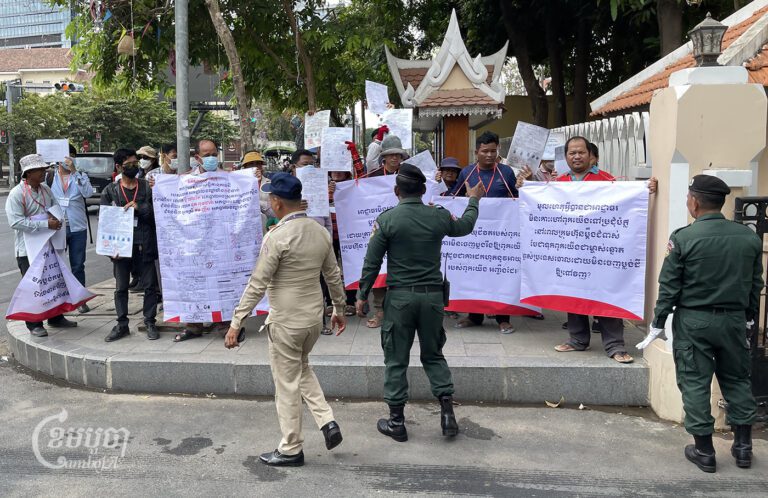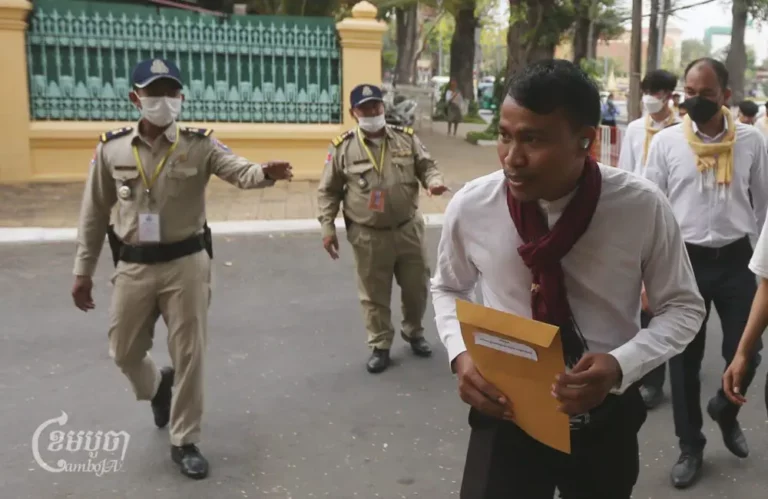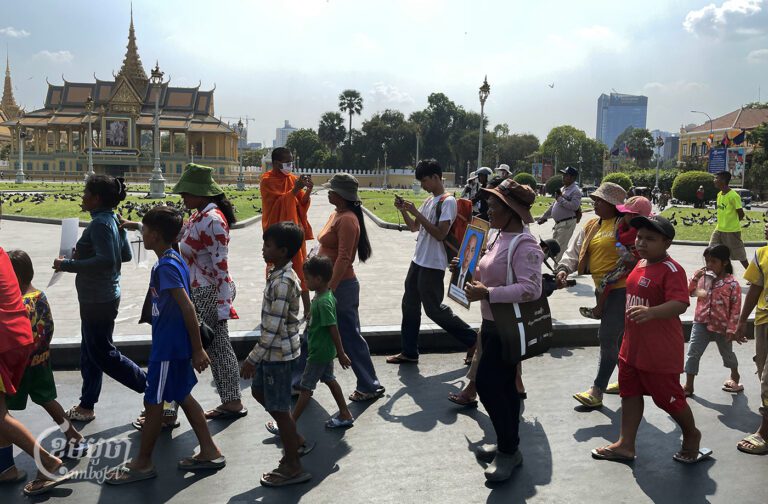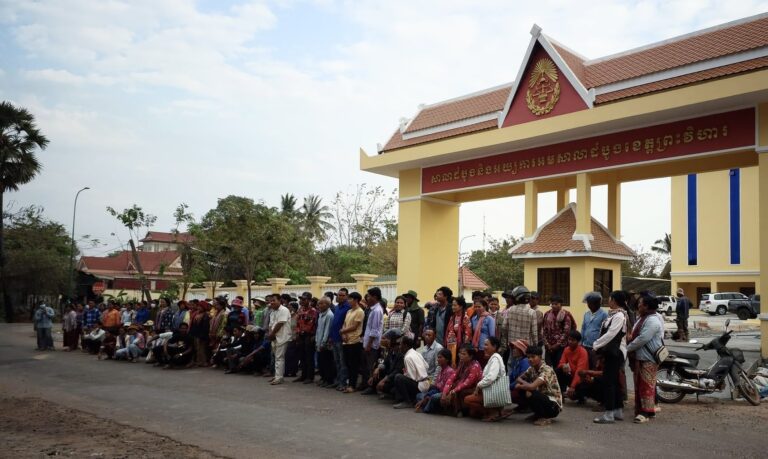As Prime Minister Hun Sen urged out-of-court settlements for land disputes during a Monday address on the grounds of the Ministry of Land Management, a crowd of about 100 families waited outside hoping to beseech the country’s top leader for help in disputes of their own.
The prime minister was speaking at the inauguration of the new Ministry of Land Management building, and while he touched on other political topics during the speech, land issues were central to the occasion. Hun Sen urged the ministry to continue registering land titles for people to secure their ownership rights and suggested extrajudicial measures be used to settle conflicts over land.
“When [land disputes] come to the court, there are winners and losers, so addressing [the issue] outside the court system is fine,” he said. “The solution must be made based on honesty. And striving to resolve economic land concessions for those who lack land is a priority, the land must be allocated for the landless people.”
Land rights are emerging as a political stumping point for the ruling CPP ahead of the 2022 commune elections. Last month, Hun Sen’s deputy Sar Kheng, who leads the Ministry of Interior, appealed to party politicians to focus on resolving land disputes as part of a campaign strategy of providing good governance on a local level.
Despite that, prominent land disputes continue to be commonplace in Cambodia, where official land rights through titling can be difficult to obtain. The title process through the national ministry is often a slow one, and so-called soft titles arranged by local officials for property sales may be disregarded in cases where major developments are at stake.
In a letter to commemorate World Habitat Day last month, rights group Licadho stated that ongoing land grabs have affected more than 5,000 families in the past two years, showing no signs of slowing despite social restrictions due to COVID-19.
The rights group stated the arrests and jailing of land community members and activists has increased over the past two years and, as of October 2021, there are at least 21 land community members and activists who have been arrested, with 10 people imprisoned.
According to Chea Sophara, the minister of Land Management, the ministry has so far issued 6.3 million land titles across the country and aims to have issued 7 million titles by 2023. Sophara also said the ministry recognized 3,184 ongoing land disputes and stated 10,634 other disputes have already been solved, although he offered little detail for either statistic.
Meanwhile, as Hun Sen and Sophara spoke on the ministry grounds, a disgruntled crowd waited outside to appeal directly to the prime minister for help saving their own land.
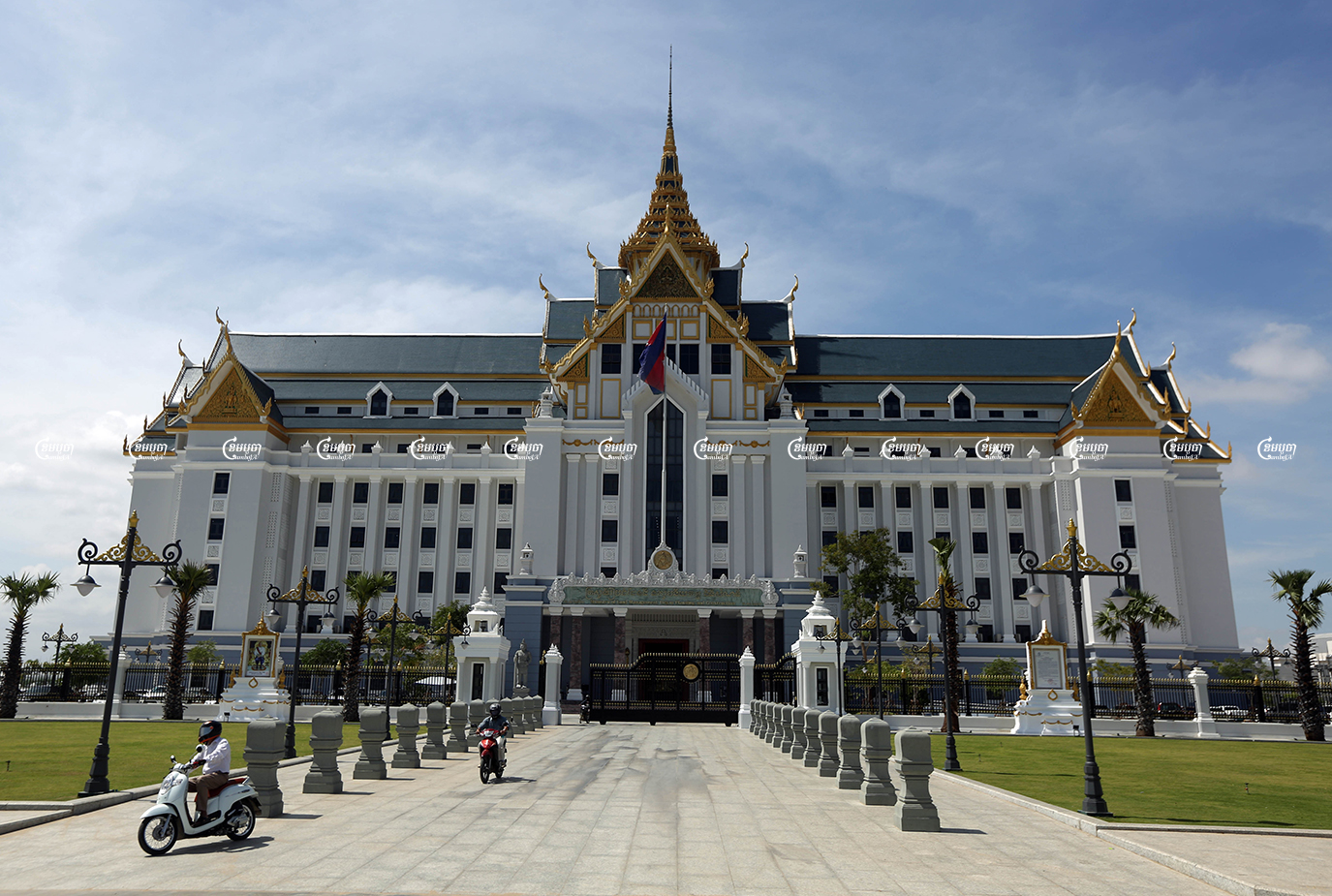
Horn Bros, the president of the Stoeng Komboth community from the capital’s Russei Keo district, was among those gathered by the ministry. The community is in Svay Pak commune and lies in the way of a municipal road development project. City officials have proposed to relocate the villagers to a location on the outskirts of Phnom Penh, in Kandal province, but the residents have refused this, seeking better compensation for the land they’d lose in Russie Keo.
“We did not oppose the development. If the compensation properly meets the market price, people will sell their land and find other places to start their lives,” he said. “We need Hun Sen’s support.”
Other land disputants who didn’t come on Monday to Phnom Penh told CamboJA they drew some hope from the prime minister’s remarks.
Hang Chinda, a representative of 24 families locked in a 25-year-long Sihanoukville land conflict for which she has been jailed twice, said she approved of Hun Sen’s comments but was not surprised by them.
“We support his recommendation. … But we are worried that while he keeps raising [this issue], local authorities do not follow,” she said. “We are also worried that they will resolve only minor cases, but not address the high-profile disputes such as those with rich and powerful people.”
The idea of resolving land disputes outside of court could theoretically work, said Licadho deputy director of monitoring Am Sam Ath, but only if handled with other principles of good governance that ensure transparency and equal treatment for all, regardless of rank or status.
“It will be good to solve basic, ordinary land disputes outside the courts, but previously if disputes happened between companies or high ranking officials and [other] people, [the powerful] have frequently used the court system to pressure, threaten and charge people to replace or accept improper compensation,” he said.
That dynamic has played out in land disputes on the site of the mega-airport development project in the Kandal Steung district of Kandal province, where approximately 300 families have rejected what they say are insufficient compensation prices to leave their land.
The more than three-year-old conflict has led to violence, official crackdowns and criminal charges filed against nine villagers. Elsewhere in Kandal province, people from seven villages in Ang Snuol district have been embroiled in a land dispute with the Ministry of Defense that in June culminated in officials shooting and injuring one protester with live ammunition.
More than 300 families in Ang Snuol say they have been forced to accept a compensation price of 40 cents per square meter of their land, a fair cut below market value. Authorities reject the villagers’ rights to the land, saying they are squatting on state-owned property.
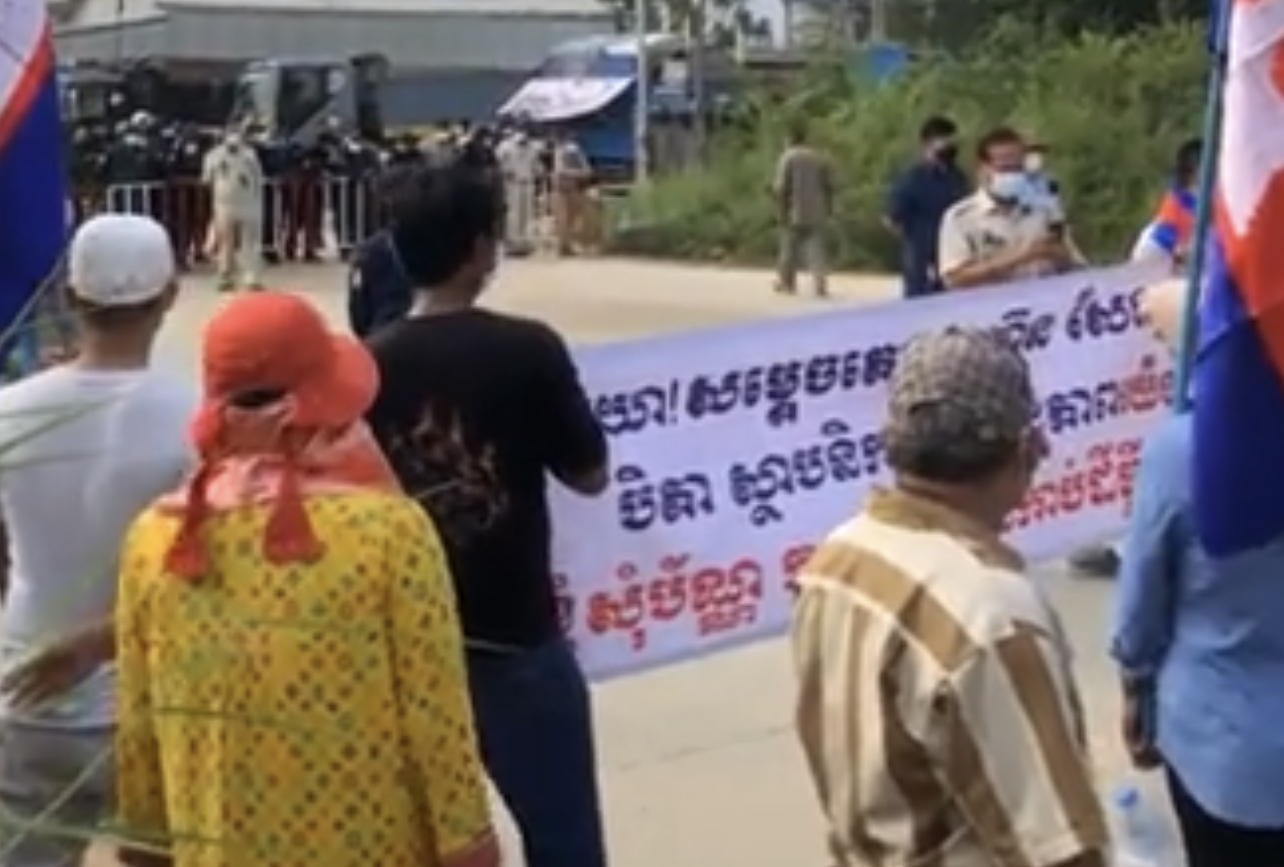
Warning and threatening
Hun Sen also used the inauguration platform to warn and threaten social commentators for arguing that Cambodia’s modern political system and institutions have failed to live up to their commitments as per the 1991 Paris Peace Agreements. In that, the prime minister also warned of potential legal action against unnamed critics of the 2006 change to requiring a simple majority in the National Assembly to approve constitutional amendments.
Such changes to the constitution had previously required a two-thirds majority to pass into law, with the process recently rising in the public eye due to an amendment last month barring dual-citizens from holding top political offices.
Social analyst Meas Ny said celebrations of the 30th anniversary of the Paris Peace Agreements seemed to be gaining momentum both at home and abroad. The agreements have been increasingly embraced by the political opposition as a platform of dissent against the CPP government.
“It becomes more and more sensitive when the issue [Paris Peace Agreements] has been widely raised and the government has to defend its legitimacy,” Ny said, adding that the prime minister’s remarks on the subject could have a chilling effect on social commentary. “Being an analyst, we are scared when there are warnings or threats because in one aspect, anything can happen anytime, and safety is still not ensured.”
Fellow analyst Seng Sary, who lives in Thailand and had in September been forcefully threatened with legal action by Hun Sen for his political comments, said the opposition and ruling party hold very different positions on the continued relevance of the Paris agreements. For his part, Sary said the agreements lay a plan for a more equal form of governance.
“Whenever there is a political stalemate, the agreement is always on the agenda to turn Cambodia back to the path of democracy and respect for human rights,” he said.


